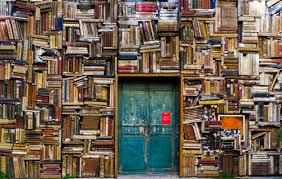Usually I’m posting about issues that I’m encountering into the circles I’m frequenting. My last post about literary gluttony is a subject I’m very familiar with. Till some reaction on my post turned my nose into the other direction; literary anorexia.
As it happens, literary anorexia seems to be a wider problem then I assumed. I used to think that the function of the novel was just absorbed by other media carriers. It turns out that illiteracy leads to “secondary orality”—a sociological term for a post-literate culture.
Television, rather than the Internet, seems to be the primary force distracting people from books. Average TV time is still rising, because TV watchers are, incredibly, watching more and more of it, the quantity rising from 3.28 hours in 2003 to 3.45 hours in 2016. In a culture of secondary orality, we may be less likely to spend time with ideas we disagree with.
The sturdiest and most convincing data about reading habits that I found came from a Dutch time-use study, which went back decades. It showed with remorseless detail how television had dethroned reading in the Netherlands between 1955 and 1995.

It’s possible that the migration of news from print to the digital realm has disguised some reading as mere computer leisure. I suspect, though, that the fraction of such computer use devoted to essays and news is too small to provide much mitigation.

Recent neuroscience confirms many of the things sufferers of digital overload know innately. Successful multi-tasking is a myth. It takes more energy to shift your attention from task to task. It takes less energy to focus.
That means that people who organize their time in a way that allows them to focus are not only going to get more done, but they’ll be less tired and less neurochemically depleted after doing it. The counterproductive tendency of multitasking is steered by following factors;
- New information creates a rush of dopamine to the brain, a neurotransmitter that makes you feel good. The brain has been trained to want a constant hit of dopamine, which a digital interruption will provide
- The promise of new information compels your brain to seek out that dopamine rush
The problems are thus identified. The secondary orality provided by the TV networks saves us from the effort to think for ourselves while a digital dopamine addiction causes some people having trouble to focus: on books, work, family and friends.
Perhaps whatever is eating away at reading is also eating away at socializing. The current digitized culture is all about immediate gratification.
For those who need some tips to increase their capacity to focus, I have the following suggestions;
- No more Twitter, Facebook, or article reading during work or school hours.
- No reading of random news articles
- No smartphones or computers in the bedroom
- No TV after dinner
- Instead, start reading a book. Reading books is a great way to regain your ability to focus and to connect with a strong evolutionary need for ingesting narrative.
Those who read own the world, and those who watch television lose it. (Werner Herzog).

I am so glad you did this post. So true about multitasking being one of the culprits here. It creates way too much information for the brain to process and work efficiently. After a while we just exhaust ourself without REALLY having accomplished anything! It’s better to assign time slots to different tasks and only do them then instead of doing a little here and a little there. It takes up way too much time and expends unnecessary energy.
LikeLiked by 1 person
Glad to oblige. The results of the research for this post were also for me an eyeopener.
LikeLiked by 1 person
Excellent post. You have some good information in here (even though it is in the digital realm and written in a similar manner as a “random news article) 😉 I’ve recently noticed my own addiction to doing something besides reading a book. I watch a lot of YouTube. I read a lot of short articles on various news feeds and forums. I have to wonder, after reading this, if I should start dedicating some amount of time a couple evenings a week to just reading books. I think there is some benefit to “quieting” the mind now and then. Reading a book would accomplish that on many levels.
LikeLiked by 1 person
I don’t think that a selective use of the internet equals to the randomly surfing habit of the smombie. For the rest I agree very much with your assessment of this post.
LikeLiked by 2 people
I think you’re right on that, too. I’ll occasionally “go down a rabbit hole”, but even then, I am not randomly surfing and just absorbing material from the internet. I am usually looking at stuff that has caught my interest. And I think the key difference is that I am thinking about what I’m reading or watching and not just accepting it because it was put out there. Again… good food for thought.
LikeLiked by 1 person